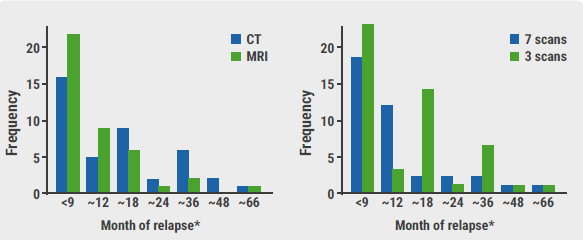https://doi.org/10.55788/02614376
The phase 3 KEYNOTE-564 trial (NCT03142334) enrolled patients with intermediate-high- or high-risk RCC, a group in whom until recently no standard-of-care existed after surgery, explained Prof. Thomas Powles (Barts Cancer Institute, UK). Participants were randomised to adjuvant pembrolizumab (n=496) or placebo (n=498). The primary analysis, published in the New England Journal of Medicine, displayed a significant disease-free survival (DFS) benefit for patients who were treated with pembrolizumab over those who received placebo [2].
After 30.1 months of follow-up, the trial update indicated that DFS was still significantly higher in the pembrolizumab arm than in the placebo arm (HR 0.63; P<0.0001), with corresponding 24-month DFS rates of 78.3% and 67.3%. This result was consistent across subgroups, including disease risk category and PD-L1 status. Importantly, an exploratory analysis indicated that the rate of distant recurrences was higher in the placebo arm than in the pembrolizumab arm (HR 0.63), both in patients with M0-disease (n=936; 29.0% vs 20.8%) and in patients with M1-disease (n=58; 55.2% vs 20.7%). Prof. Powles added that the overall survival results were not yet mature, with 66 of the 200 needed events registered to date, but that a promising trend could be observed (HR 0.52; 95% CI 0.31–0.86).
The updated safety analysis did not reveal a substantial increase in adverse events (AEs). Fatigue (20.3%), pruritis (18.6%), hypothyroidism (17.4%), diarrhoea (15.8%), and rash (15.0%) were the most common any-grade AEs in the pembrolizumab arm.
- Powles T, et al. Pembrolizumab (pembro) as adjuvant therapy for patients (pts) with renal cell carcinoma (RCC): Updated results from the 30-month follow-up of KEYNOTE-564. Game-changing session 2, EAU 2022, 01–04 July.
- Chouieri TK, et al. N Engl J Med 2021;385:683–694.
Copyright ©2022 Medicom Medical Publishers
Posted on
Previous Article
« Fewer complications with robotic surgery in renal cancer Next Article
New prognostication in N3 penile cancer »
« Fewer complications with robotic surgery in renal cancer Next Article
New prognostication in N3 penile cancer »
Table of Contents: EAU 2022
Featured articles
Darolutamide performs well across subgroups in mHSPC
Genitourinary Cancer
Does systematic biopsy add value to the detection rate of prostate cancer?
PSMA PET/CT cannot replace mpMRI for diagnosis of prostate cancer
Prostate cancer treatments reduce quality of life
PROpel: Good results for abiraterone plus olaparib in mCRPC
Neoadjuvant hormonal therapy promising in high-risk prostate cancer
Darolutamide performs well across subgroups in mHSPC
Shorter hospital stay with robotic surgery versus open surgery in bladder cancer
Improved risk stratification for high-risk NMIBC
Adjuvant atezolizumab may benefit ctDNA-positive patients with post-op muscle-invasive urothelial carcinoma
New prognostication in N3 penile cancer
KEYNOTE-564: Updated results of adjuvant pembrolizumab in RCC
Fewer complications with robotic surgery in renal cancer
Functional Urology
Novel therapeutic targets for benign prostatic hyperplasia
Mini-slings non-inferior to standard mid-urethral slings in SUI
Non-inferiority of methenamine hippurate to antibiotics in recurrent UTIs
Related Articles
September 16, 2020
Monthly belimumab infusions preserve kidney function in some lupus patients

© 2024 Medicom Medical Publishers. All rights reserved. Terms and Conditions | Privacy Policy
HEAD OFFICE
Laarderhoogtweg 25
1101 EB Amsterdam
The Netherlands
T: +31 85 4012 560
E: publishers@medicom-publishers.com

